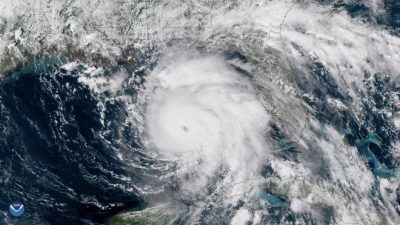Hurricane Michael: Floridians Paying for Governor Scott’s Climate Denialism

For the first time in recorded history, a Category 4 hurricane is striking the Florida Panhandle.
Hurricane Michael made landfall today, packing winds of 145 miles per hour — strong enough to collapse houses and cause massive damage to other infrastructure. Forecasts have also warned of a storm surge that could reach a stunning 14 feet in height.
The Saffir-Simpson Hurricane Wind Scale used by the National Oceanic and Atmospheric Administration’s (NOAA) National Hurricane Center describes a Category 4 hurricane’s winds thus:
Catastrophic damage will occur: Well-built framed homes can sustain severe damage with loss of most of the roof structure and/or some exterior walls. Most trees will be snapped or uprooted and power poles downed. Fallen trees and power poles will isolate residential areas. Power outages will last weeks to possibly months. Most of the area will be uninhabitable for weeks or months.
The storm is powerful enough that it will remain a hurricane long after it is far inland: Models show it will still have hurricane-force winds by the time it reaches as far inland as Albany, Georgia.
The storm exploded in intensity in the 24 hours before making landfall. Reuters reported on Weather Underground meteorologist Bob Hensen’s assessment of this phenomenon: “Satellite images of Michael’s evolution on Tuesday night were, in a word, jaw-dropping.”
Experts are warning that damage is expected to be “catastrophic,” and rainfall of up to half a foot could be dumped across much of the Carolinas, which are still recovering from Hurricane Florence.
Truthout has reported repeatedly on how human-caused climate change is super-charging the amount of rainfall potential for hurricanes. The current storm is displaying what scientists have been warning us about for years.
Hurricane Michael Is Not a Surprise
NOAA’s Geophysical Fluid Dynamics Laboratory has been warning us for years that human-caused climate change would increase key variables of hurricanes, including wind strength, the amount of rainfall, and storm surge levels.
The lab’s main conclusions on “detectable” changes are clear: Sea-level rise should be causing higher storm surge levels, rainfall rates will likely increase, tropical cyclone intensities around the globe will increase, and the proportion of storms being either Category 4 or 5 will increase.
Meanwhile, Florida Governor Rick Scott, who made a name for himself as a world-class climate change denialist by forbidding state employees from using the words “climate change” or “global warming,” is warning state residents of the ferocity of the current storm.
In 2017, Gov. Scott approved Florida’s “anti-science law,” which The Guardian reported as being “aimed at allowing legal challenges to the teaching of the realities of climate change and global warming in the state’s classrooms.”
Last year, the Tampa Bay Times reported that Gov. Scott’s personal investments in the energy industry actively helped shape Florida’s lack of adequate policies towards dealing with climate change impacts. The report showed how parts of Gov. Scott’s quarter-billion-dollar fortune were invested in petroleum and power-generating companies that are directly opposed to restricting greenhouse gas emissions, as well as environmental regulations.
More importantly, given his denialism, Gov. Scott has not committed state resources to relocating people in flood zones, or preparing communities for storms like Hurricane Michael.
Given that we know human-caused climate change impacts will only continue to intensify from now on, and damage from hurricanes such as this one will increase right along with them, Florida is the micro of the macro of a country led by a climate change-denying president.
*
Note to readers: please click the share buttons above. Forward this article to your email lists. Crosspost on your blog site, internet forums. etc.
Dahr Jamail, a Truthout staff reporter, is the author of The Will to Resist: Soldiers Who Refuse to Fight in Iraq and Afghanistan (Haymarket Books, 2009), and Beyond the Green Zone: Dispatches From an Unembedded Journalist in Occupied Iraq (Haymarket Books, 2007). Jamail reported from Iraq for more than a year, as well as from Lebanon, Syria, Jordan and Turkey over the last 10 years, and has won the Martha Gellhorn Award for Investigative Journalism, among other awards.
Featured image is from Live Science.

